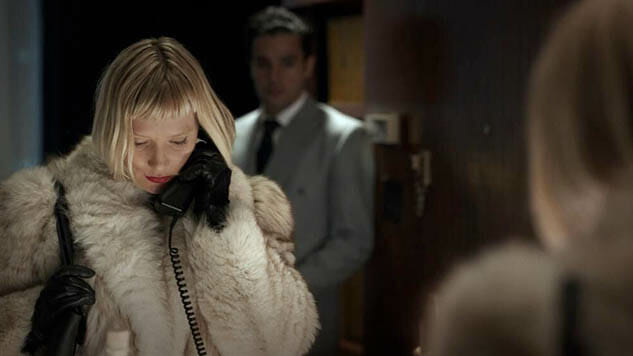Piercing
Photos via Universal Pictures Content Group
Nicolas Pesce makes unpleasant movies. The Eyes of My Mother, his debut, confronts big, gnarly questions about the banality of evil and the generational, bloodborne pathogen of trauma by being gnarly itself, a cross between a gothic ghost story and a bit of New French Extremity, shot in haunting black-and-white, an altogether miserable, if handsome, experience. Only in retrospect does the shock of what Pesce accomplishes begin to dissipate, and the space such an experience held grows cold. About a young woman who witnesses her mother’s brutal murder as a child, as an adult reenacting the inhuman punishment her permanently traumatized father inflicted on the murderer, but this time on seemingly random innocents, The Eyes of My Mother goes to extraordinary lengths to make visceral the basest of ideas: There is no such thing as justice; broken people break the people they love most; nothing happens for a reason; everything is terrible and terribleness inescapable; the end. Were it not so seriously bleak, the film’s take on its pitch-black subject matter could have reveled in some welcome absurdity.
Piercing, Pesce’s follow-up, deals pretty much with the exact same thematic concerns as his first feature, only this time aims for something…funnier? Written by Pesce and based on a novel by Ryu Murakami (who also wrote Audition, the book on which Takashi Miike’s adaptation is based, natch), the film’s a two-hander between mild-mannered psychopath Reed (Christopher Abbott, peak stillness) and the prostitute, Jackie (Mia Wasikowska), he intends to kill in order to purge his darkest tendencies and return to domesticity with his wife (Laia Costa) and newborn, whom he’s been lately resisting the urge to stab with an ice pick. The humor, one mostly gathers, is in how inherently bad the professional-minded Reed is at being a murderer. Despite seemingly months of planning—despite a bravura sequence in which Reed goes through the physical motions of his murder, accompanied by stomach-churning sound design and proof that Abbott may have a successful back-up career as a mime—Reed reads as a sexless doofus, his homicidal tendencies an exigency of his weird social impotence.
As in The Eyes of My Mother, Pesce has a precise tone in mind—a kind of modern giallo by way of ’70s De Palma—and he’s ably to masterfully capture that anachronistic limbo between the vaguely now and the vaguely then. Working with cinematographer Zack Galler, Pesce luxuriates in what such genre forebears attached to such pulpy plots, making every dutch angle and tense split-screen a showcase for magnificent shadows, sallow skin, and deep-red wounds. Piercing, at least, is a tactile dreamscape, meant to help the viewer find touchable bliss in all these manifestations of trauma.